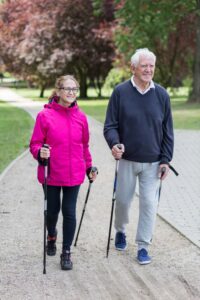Written by Jessica Patella, ND. The study determined that a higher total protein intake and higher plant-based protein intake were positively associated with muscle mass in the elderly.
 Sarcopenia, or the loss of muscle mass in the elderly, is one of the major concerns in the overall quality of life for older adults1. There are an estimated 54.1 million Americans 65 years of age or older, which represent about 16% of the population2. Researchers were interested in the association between the amount and type of dietary protein intake and muscle mass in older adults1. Until now, few studies have examined what type of protein may provide the greatest value for improving muscle mass1.
Sarcopenia, or the loss of muscle mass in the elderly, is one of the major concerns in the overall quality of life for older adults1. There are an estimated 54.1 million Americans 65 years of age or older, which represent about 16% of the population2. Researchers were interested in the association between the amount and type of dietary protein intake and muscle mass in older adults1. Until now, few studies have examined what type of protein may provide the greatest value for improving muscle mass1.
The research included 4826 participants, 60 years of age and older. All participants were from the China Health and Nutrition Survey (CHNS) of 2018. Protein intake data was collected during face-to-face interviews and included a 3-day dietary recall of 2 weekdays and 1 weekend day. The interviews included detailed questions and pictures to better determine amounts of nutrient intake over the 3-day period. Then skeletal muscle mass data was recorded via bioelectrical impedance analysis1. For the dietary analysis plant protein sources were those from cereals, tubers, starches, legumes, vegetables, fruits, fungi, algae, nuts and seeds. While animal protein sources were those from meat, poultry, milk, eggs, and aquatic products1.
Of the 4826 older adults, a total of 9.8% had low muscle mass. Those with lower muscle mass were more likely to consume less calories (1755.1 +/- 867.3 vs 1817.0 +/- 819.1 kcal/day); p=0.0245), have a lower BMI (19.8 +/- 2.8 vs 24.7+/-4.4 kg/m2; p<0.0001), have lower muscle mass (15.0 +/- 4.2 vs 18. 0+/- 7.3 kg; p<0.0001), have lower relative skeletal muscle index (5.9+/- 1.1 vs 7.2 +/- 1.8 kg/m2; p<0.0001) and perform less physical activity (60.7 +/- 116.9 vs 68.3 +/- 105.0 MET-h/w; p=0.0359)1.
Additional findings were as follows:
- There was a statistical difference in total protein consumption between the normal muscle mass group and low muscle mass group. (males: 63.2+/- 32.0 vs 60.5+/- 34.9 g/day; p=0.0491) (females: 54.4+/- 28.4 vs 52.5+/- 35.0 g/day; p=0.0426)
- There was a statistical difference in plant protein consumption between the normal muscle mass group and low muscle mass group. (males: 31.8 +/- 18.8 vs 30.2 +/- 17.4 g/day; p=0.0477) (females: 27.9 +/- 16.9 vs 26.1 +/- 15.6 g/day; p=0.0468)
- There were no significant differences in animal protein consumption between the normal muscle mass and low muscle mass groups.
- Those in the highest total protein group had an increase in muscle mass of 0.96 kg in men and 0.48 kg in women. Similarly, the highest vegetable protein group had an increase in muscle mass by 0.76 kg in men and 0.35 kg in women (in comparison to those with the lowest protein intake).
In conclusion, a higher total protein intake and higher plant-based protein intake were positively associated with muscle mass in the elderly. It is important to note this research included only older adults from China. In China, there tends to be less animal protein consumption and the data may not correlate to a typical elderly person in the United States. Researchers concluded the elderly population of China should be encouraged to consume a moderate amount of protein to improve muscle mass1.
Source: Ouyang, Yifei, Feifei Huang, Xiaofan Zhang, Li Li, Bing Zhang, Zhihong Wang, and Huijun Wang. “Association of Dietary Protein Intake with Muscle Mass in Elderly Chinese: A Cross-Sectional Study.” Nutrients 14, no. 23 (2022): 5130.
© 2022 by the authors. Licensee MDPI, Basel, Switzerland. This article is an open access article distributed under the terms and conditions of the Creative Commons Attribution (CC BY) license (https://creativecommons.org/licenses/by/4.0/).
Click here to read the full text study.
Posted June 1, 2023.
Jessica Patella, ND, is a naturopathic physician specializing in nutrition and homeopathic medicine and offers a holistic approach to health. She earned her ND from Southwest College of Naturopathic Medicine in Tempe, AZ, and is a member of the North Carolina Association of Naturopathic Physicians. Visit her website at www.awarenesswellness.com.
References:
- Ouyang Y, Huang F, Zhang X, et al. Association of Dietary Protein Intake with Muscle Mass in Elderly Chinese: A Cross-Sectional Study. Nutrients. Dec 2 2022;14(23)doi:10.3390/nu14235130
- Living TAfC. 2020 PROFILE OF OLDER AMERICANS. May 2021 2021;
